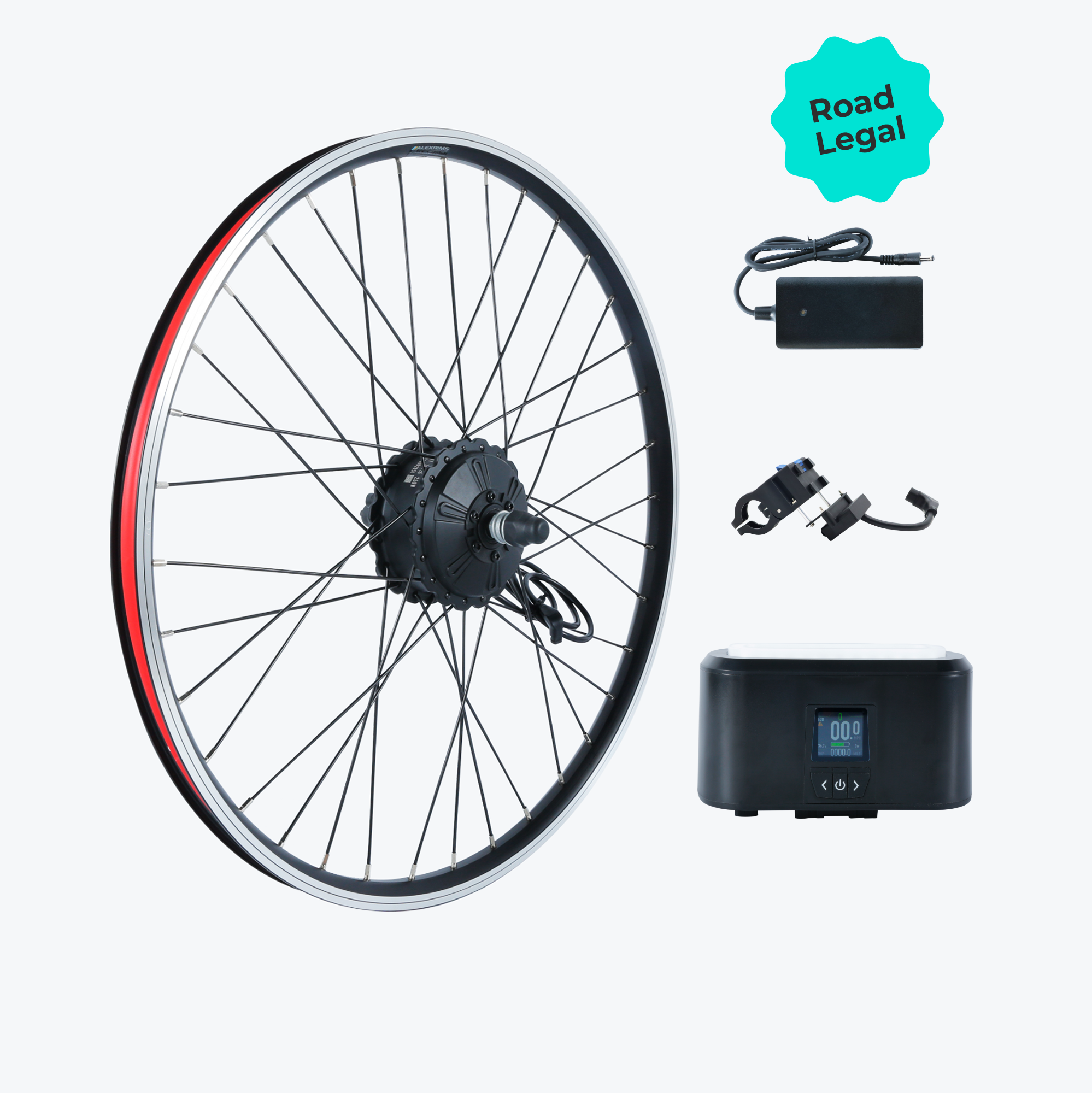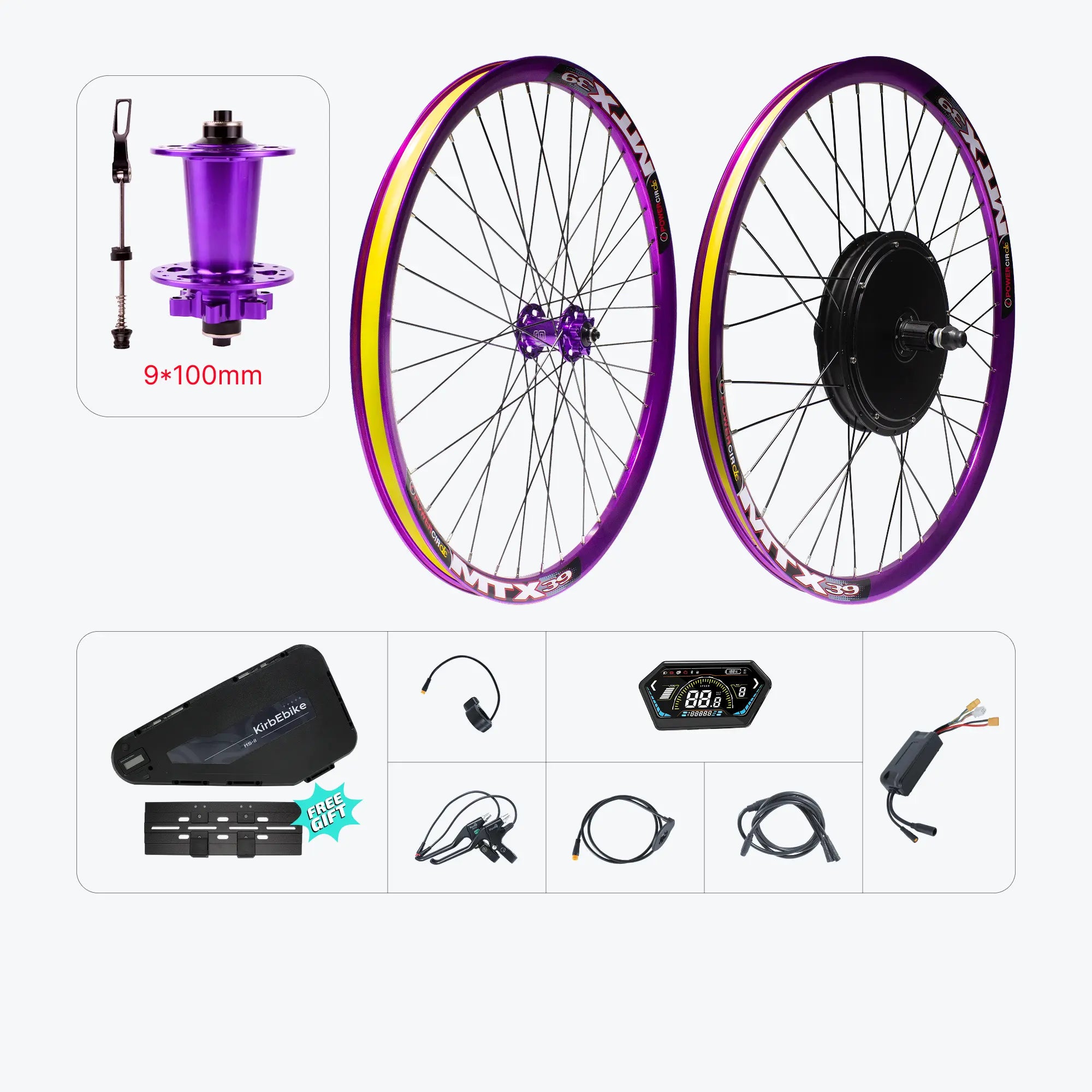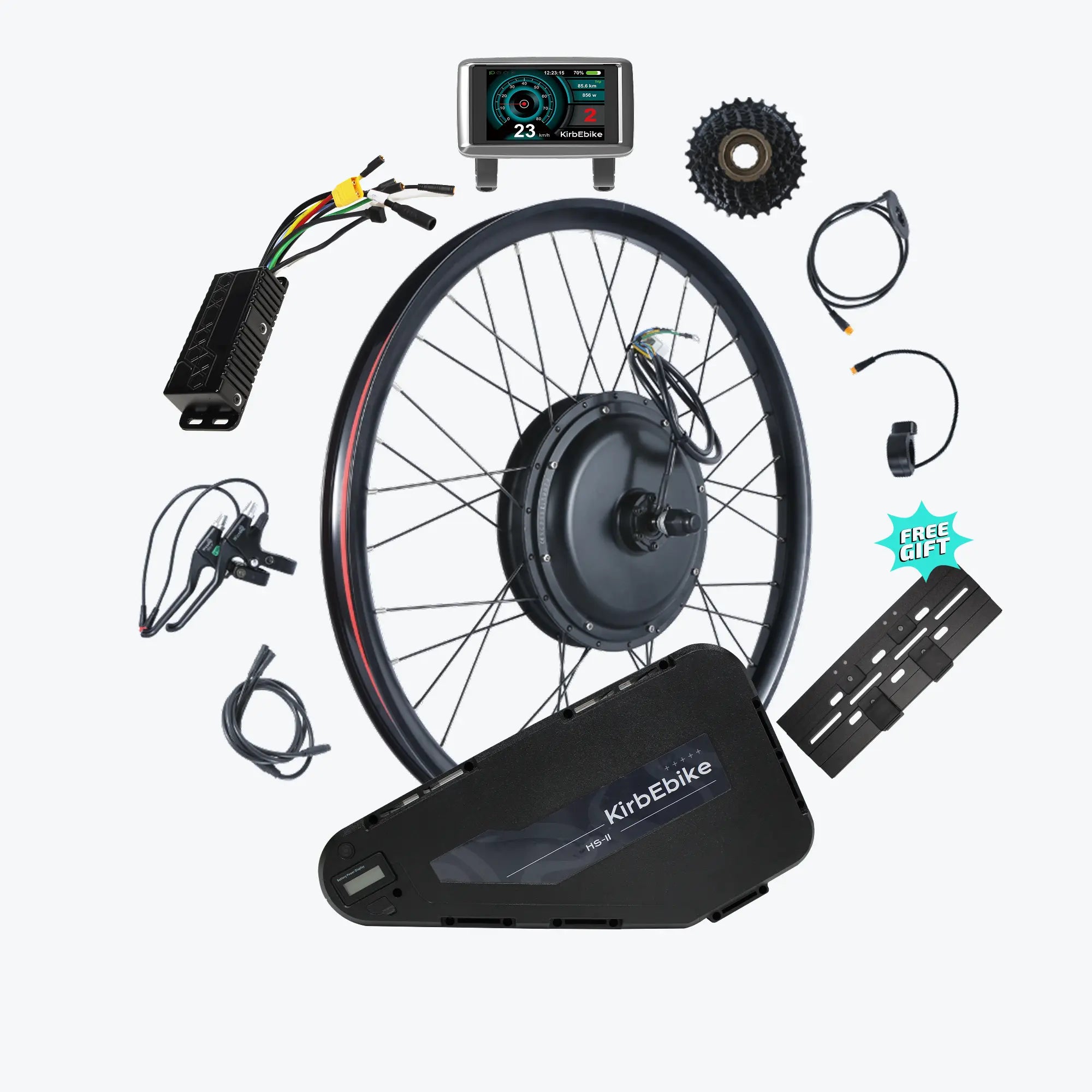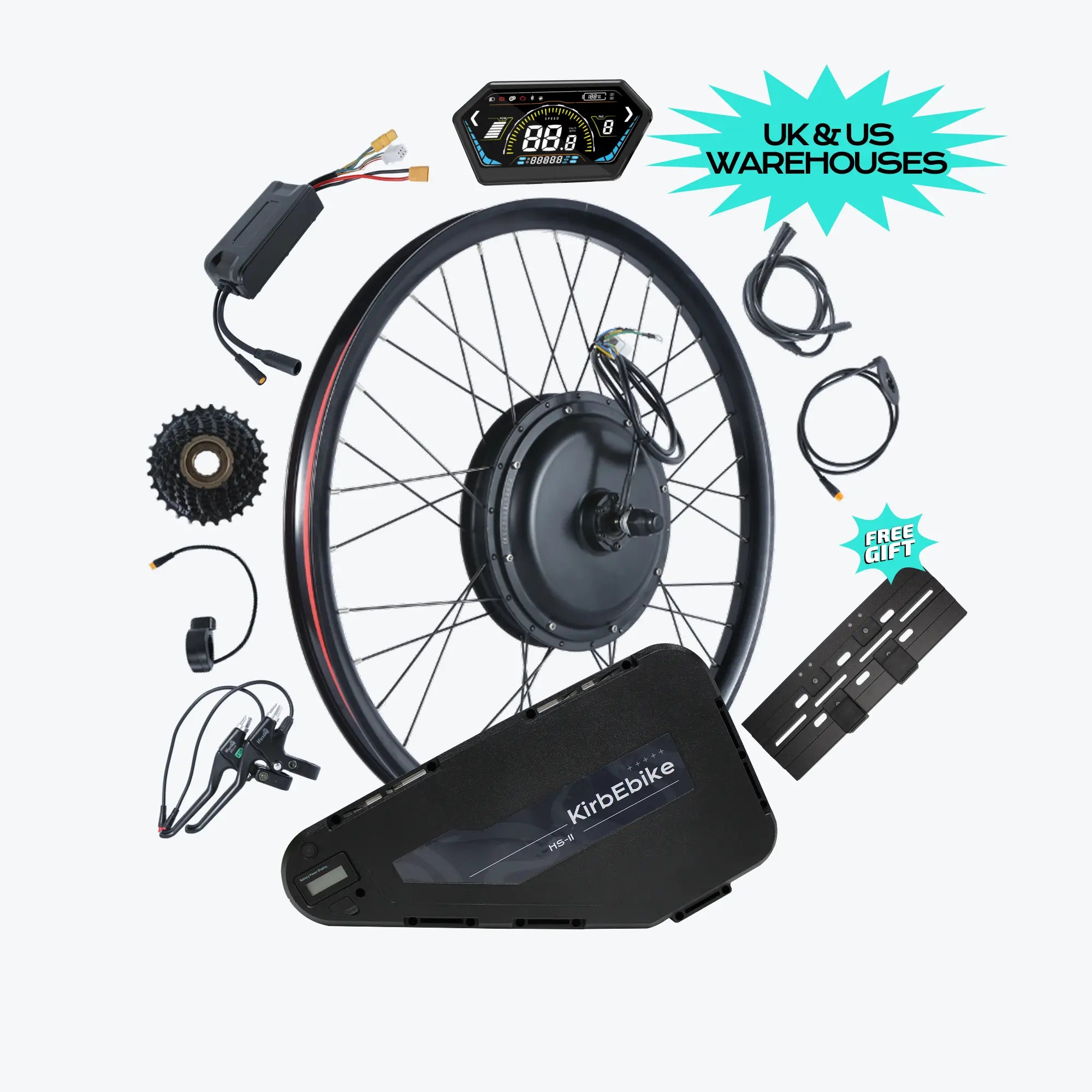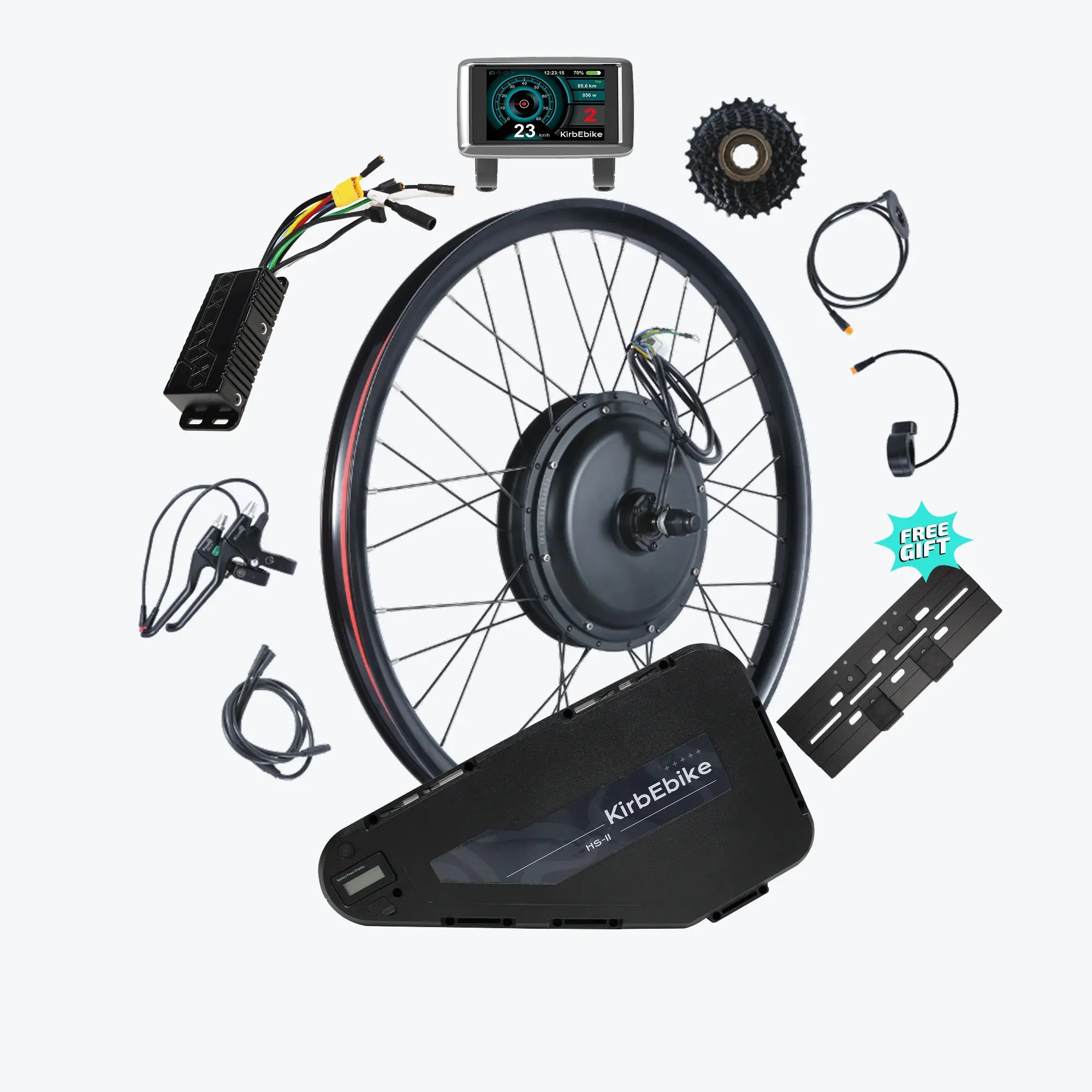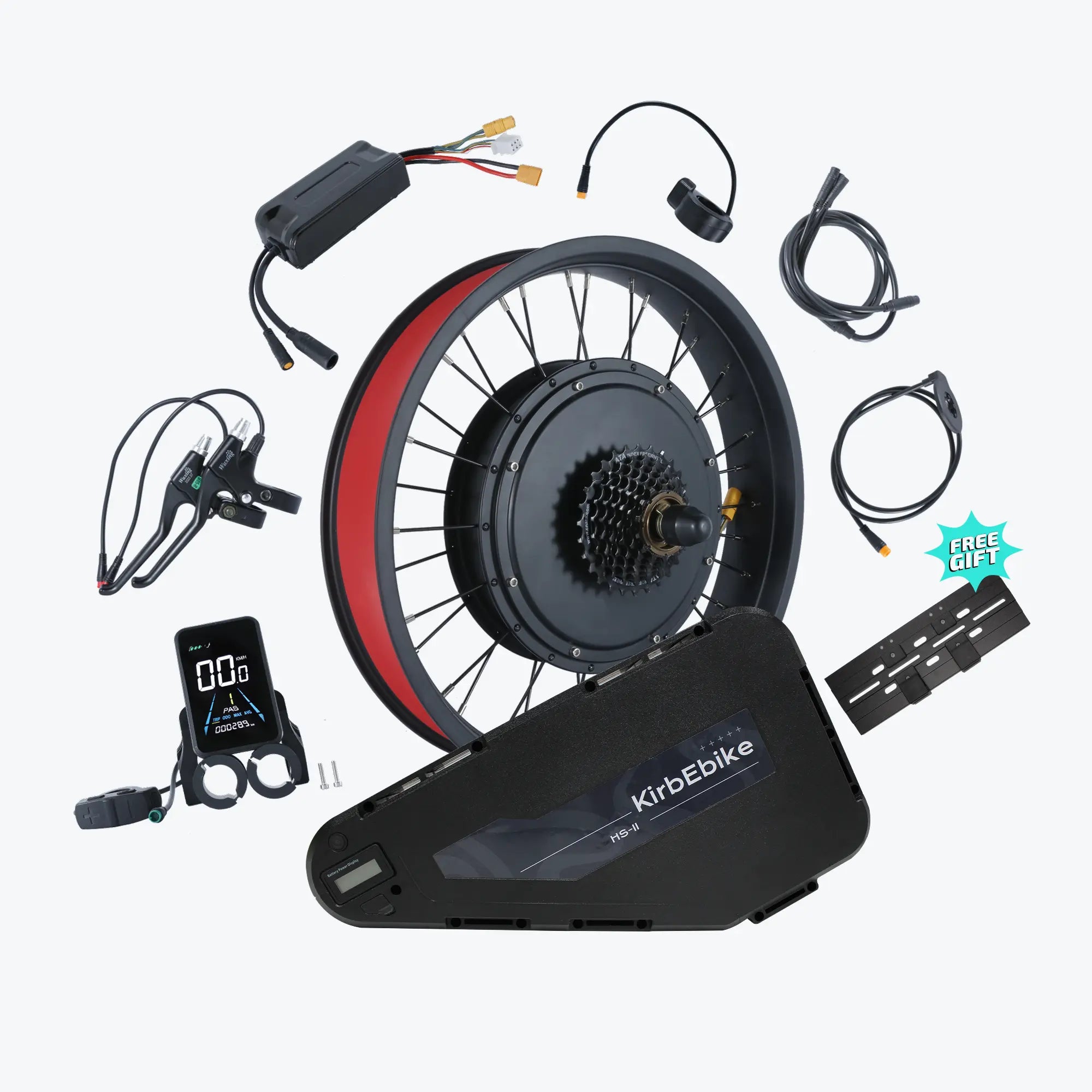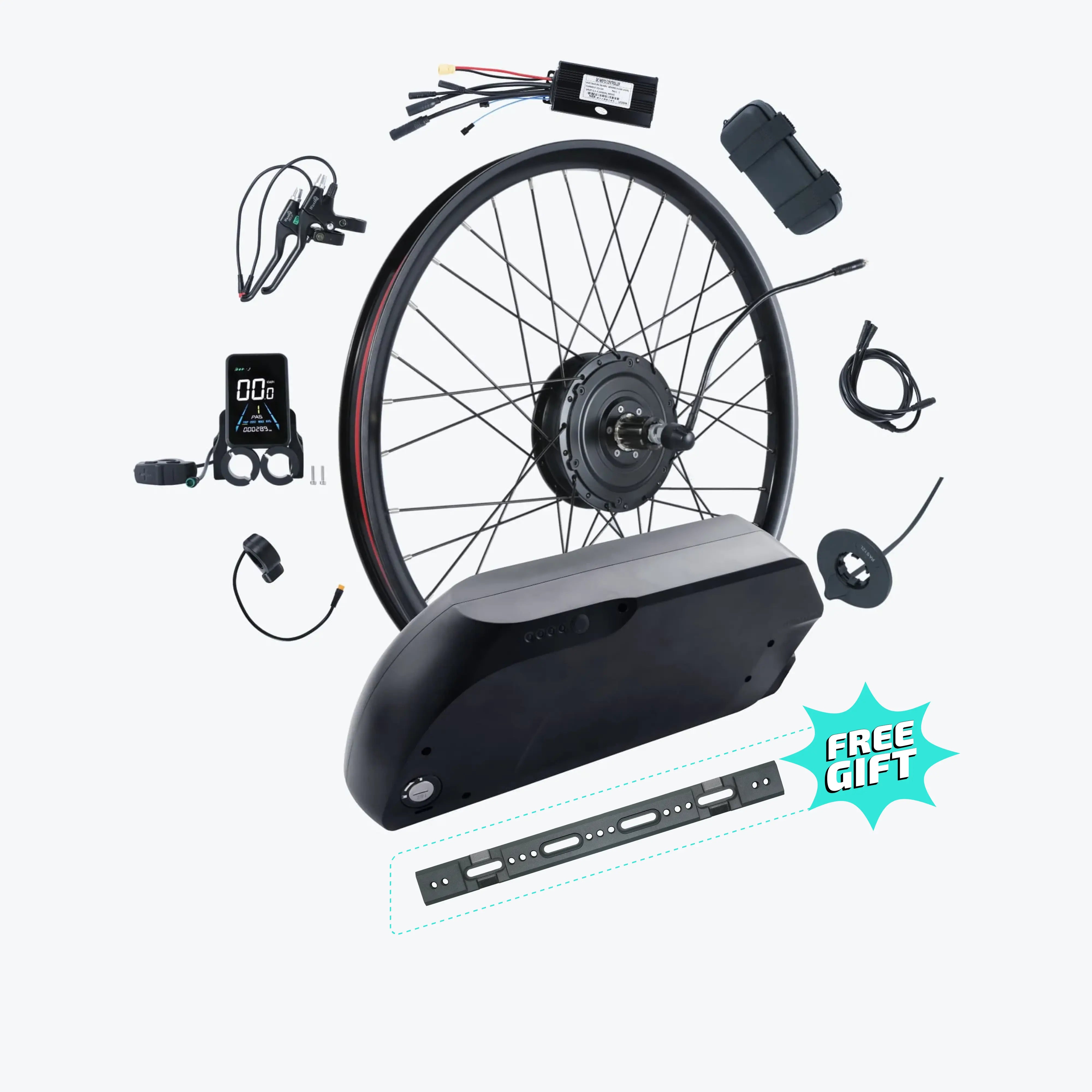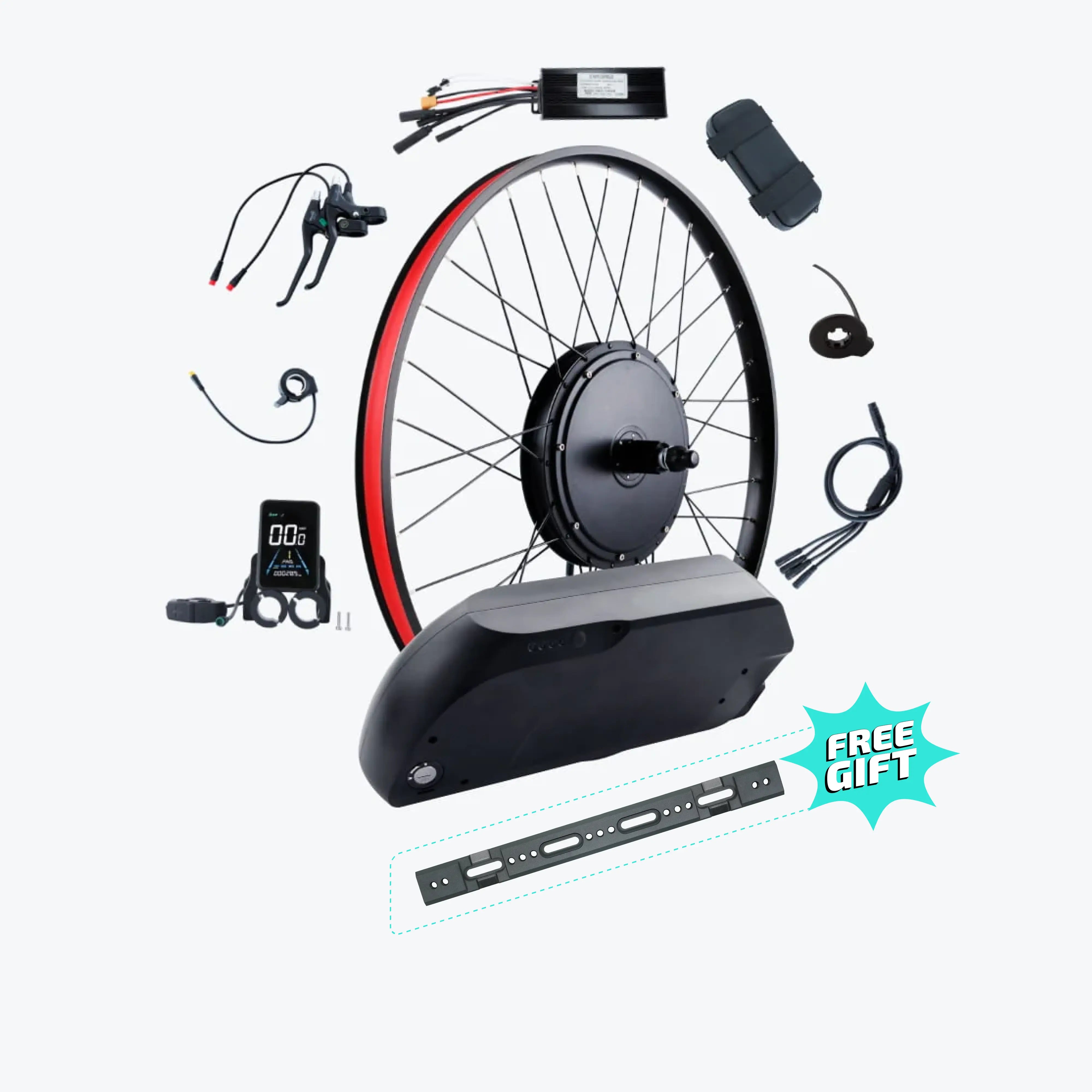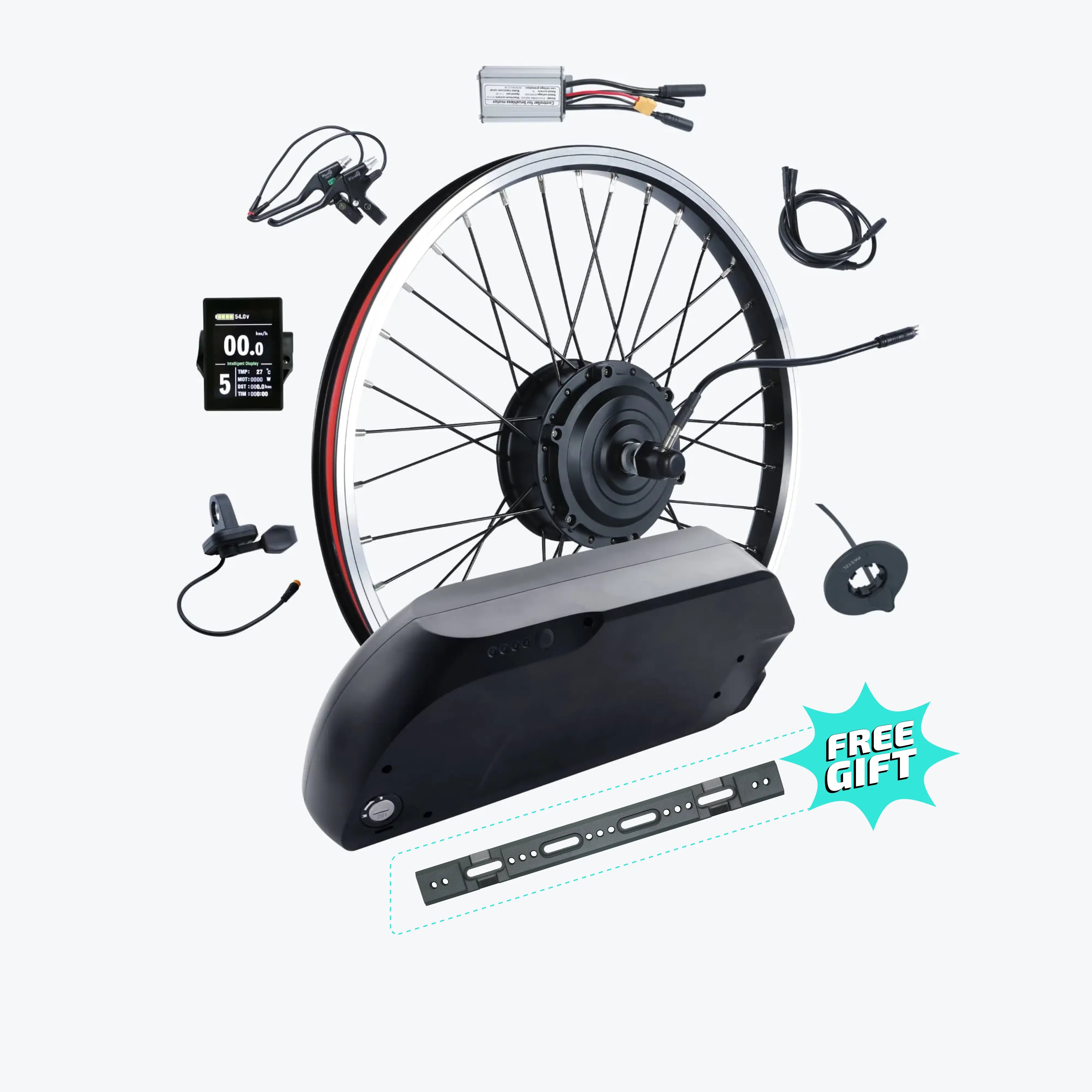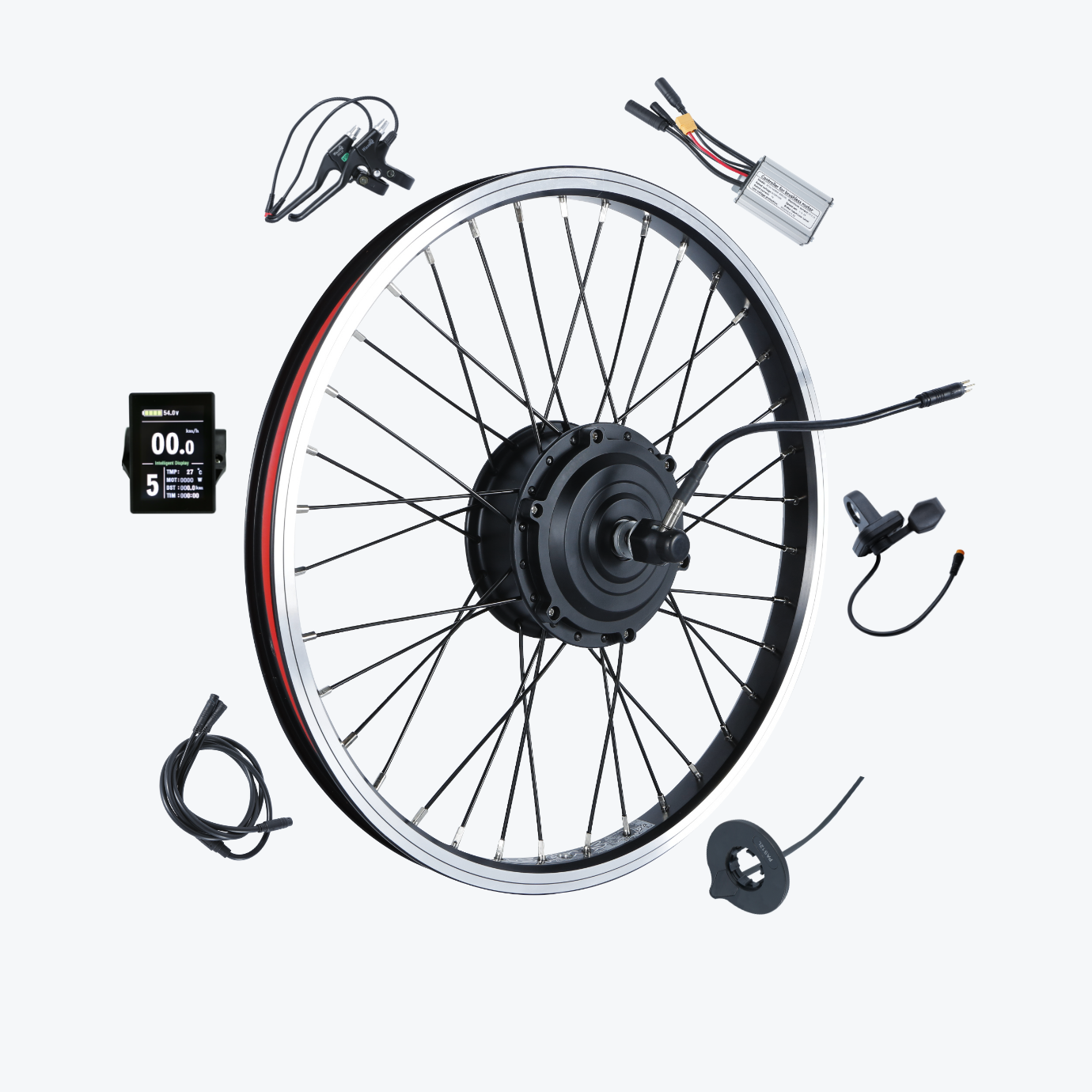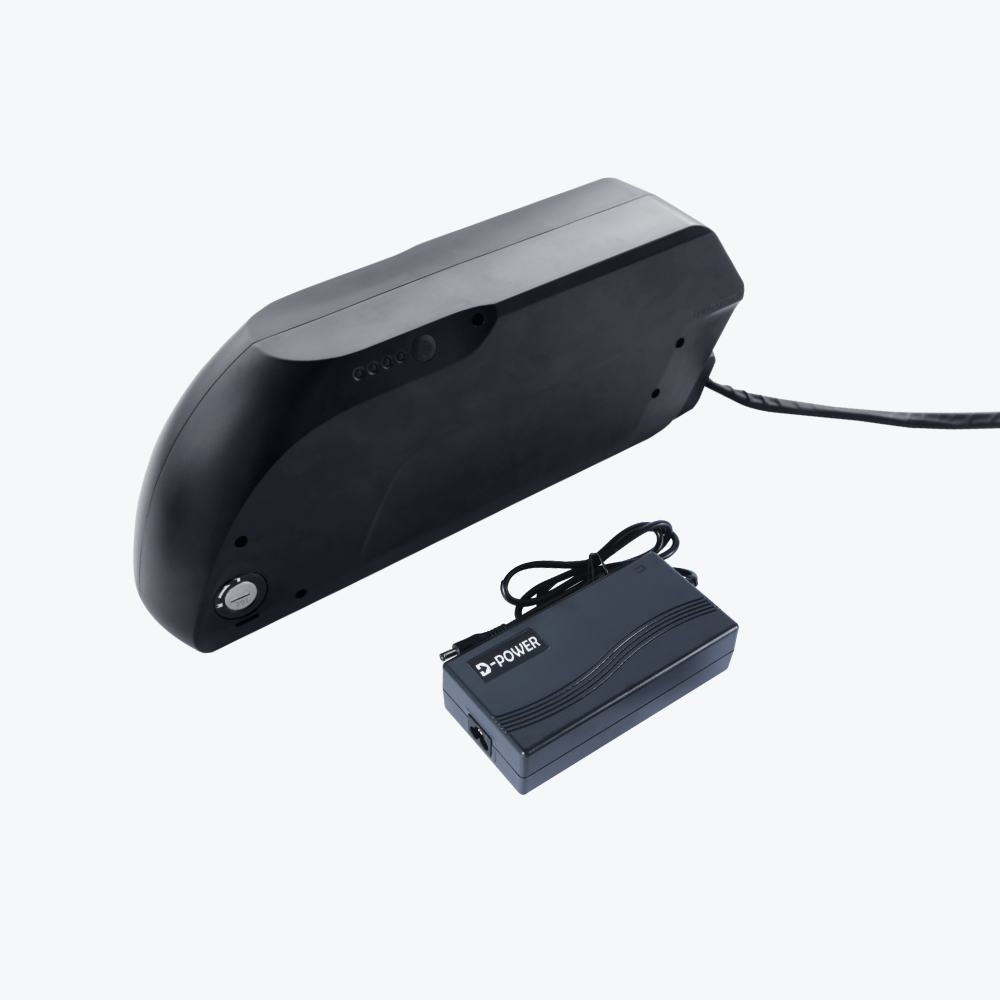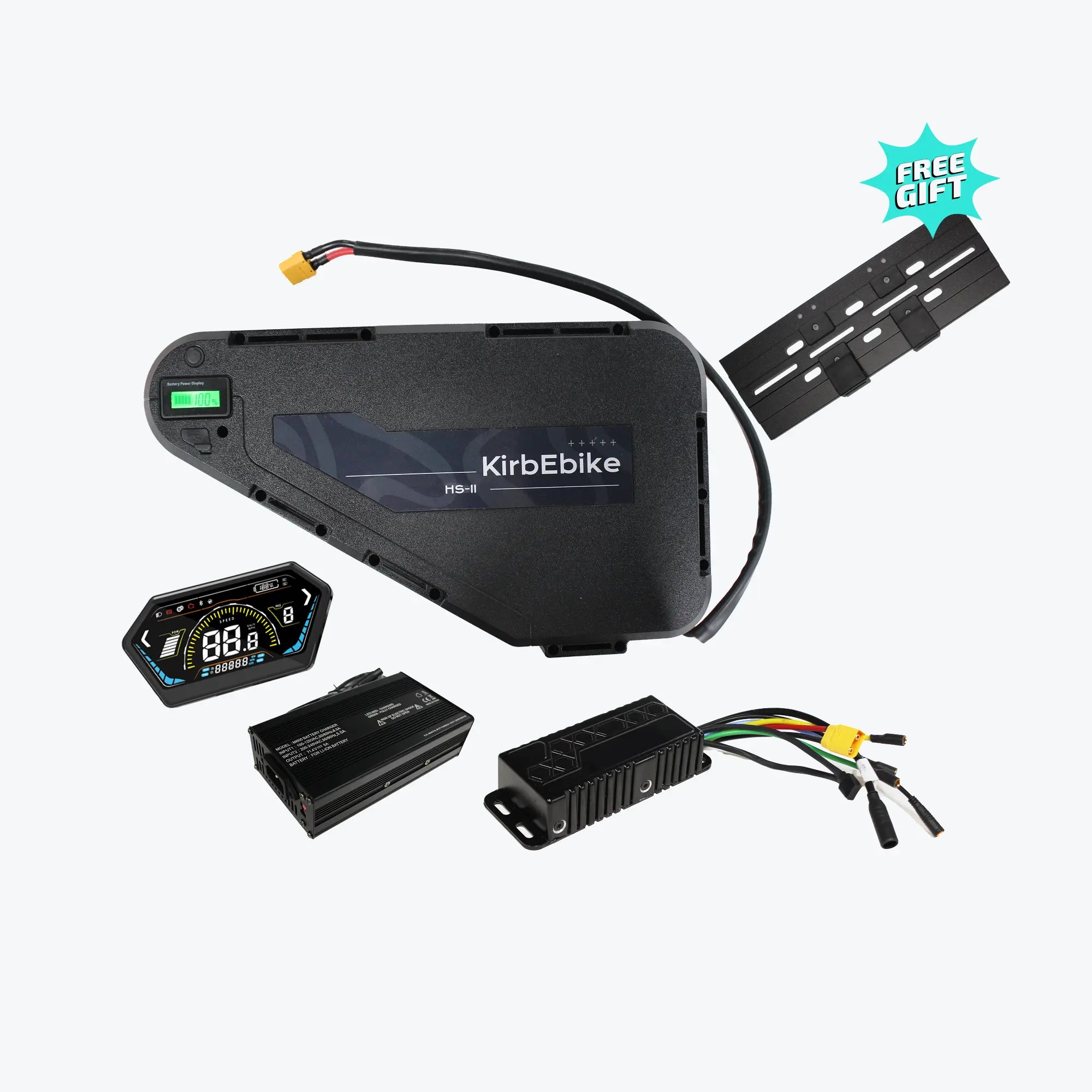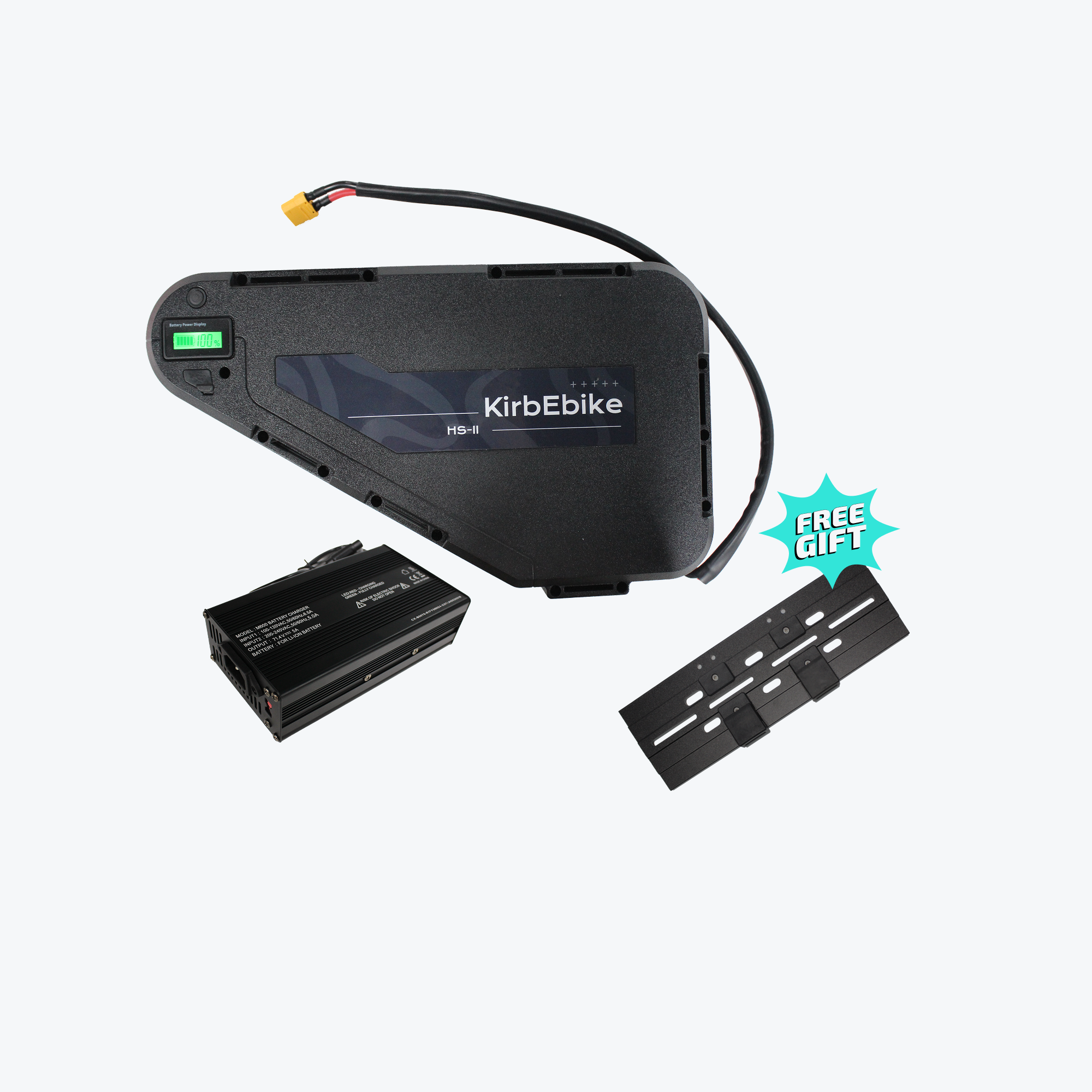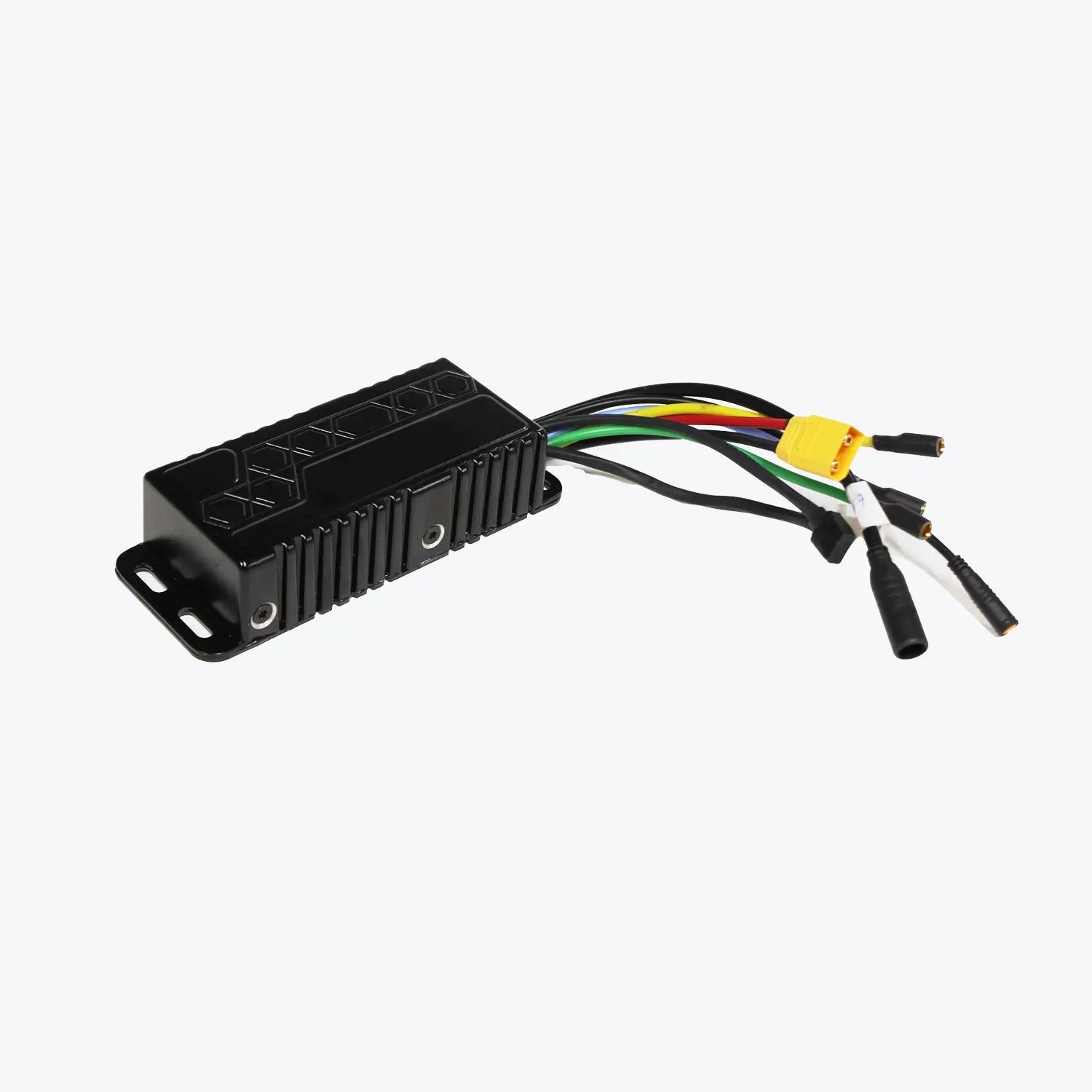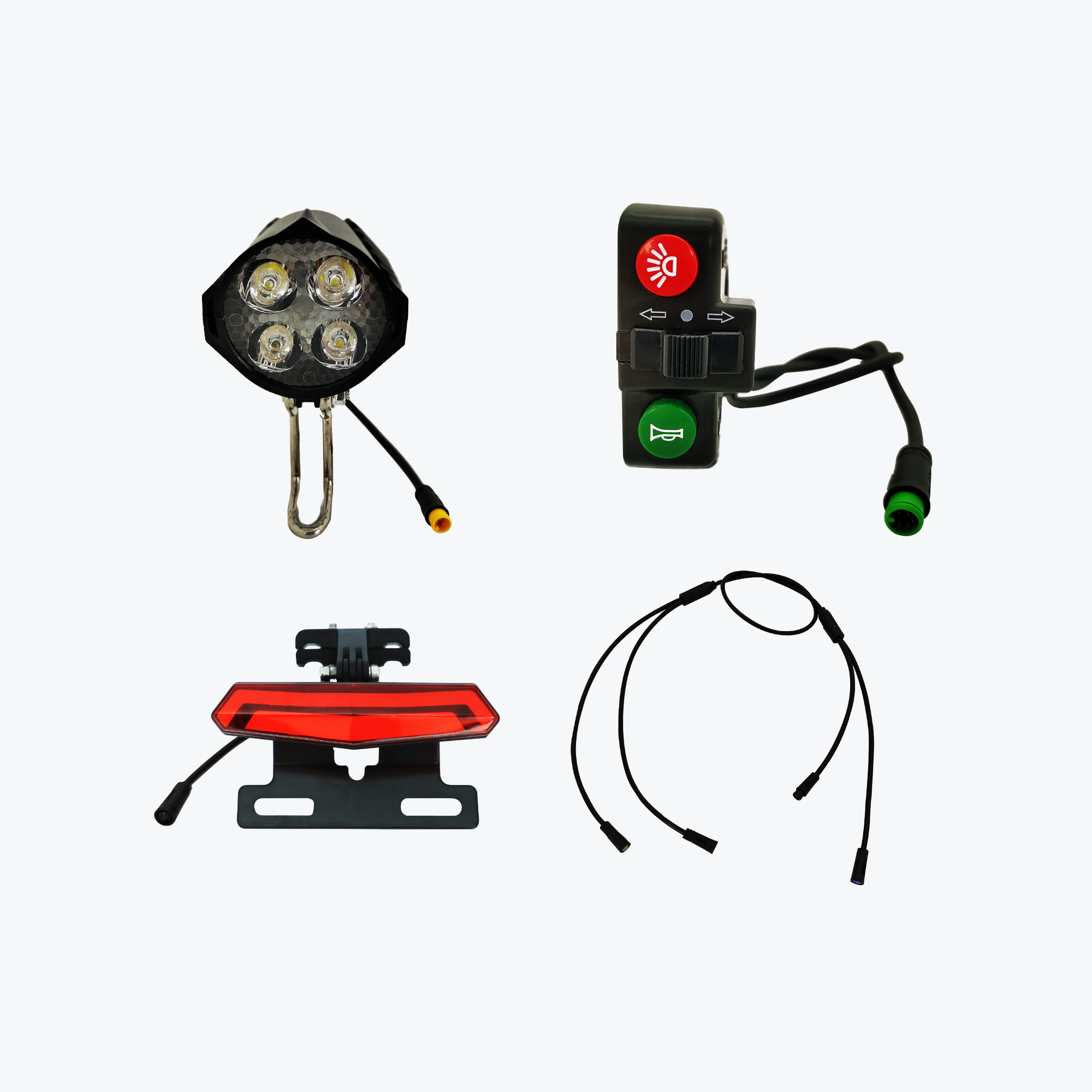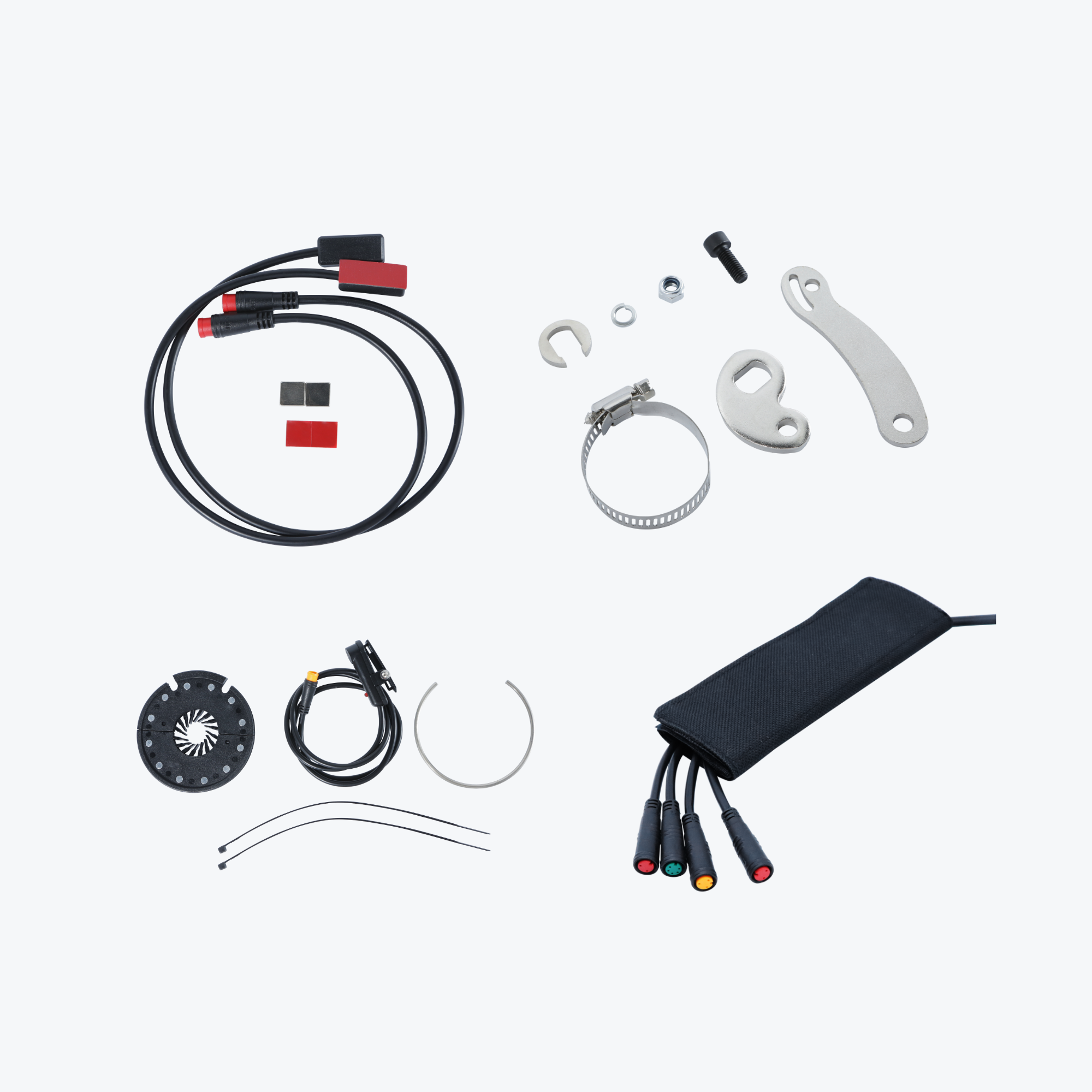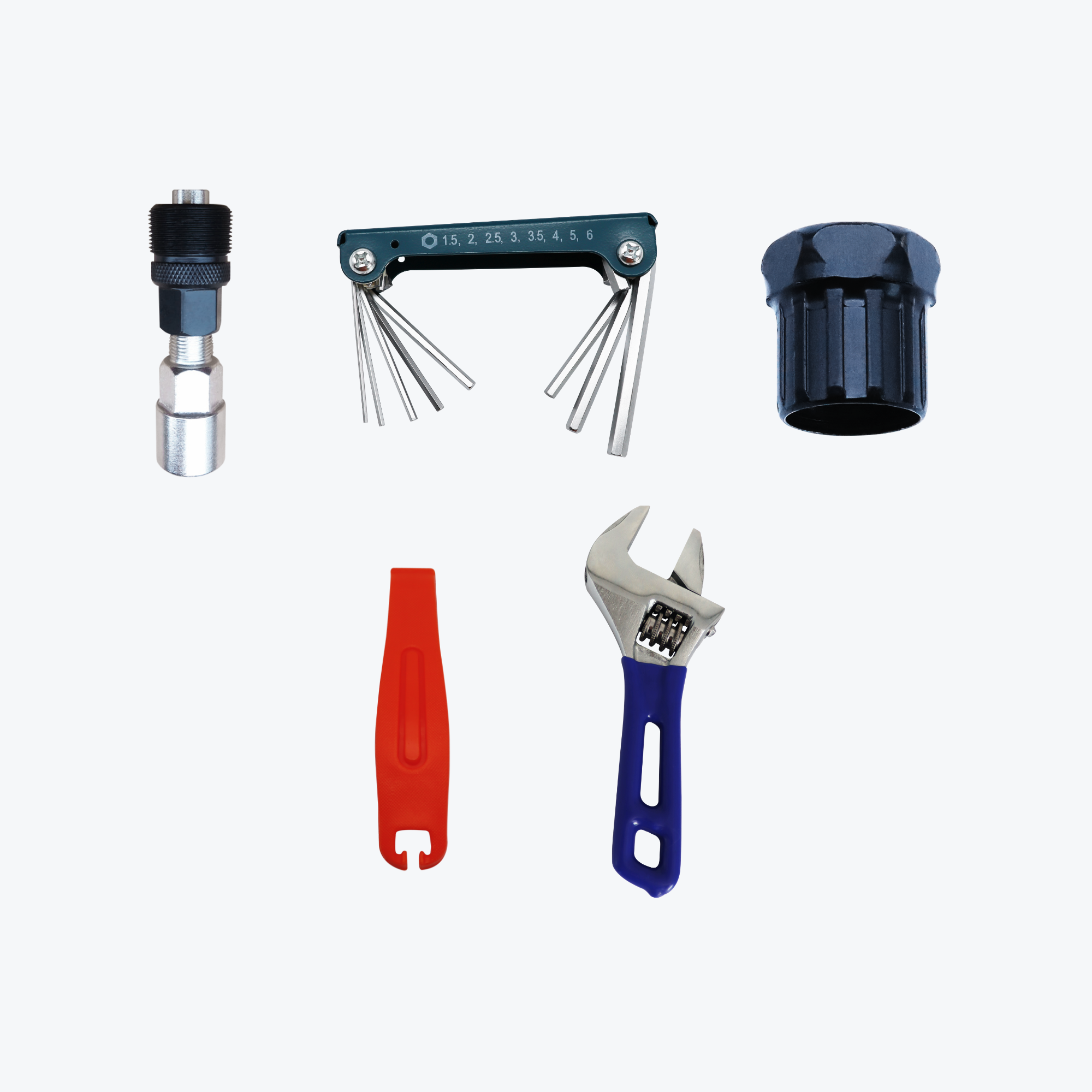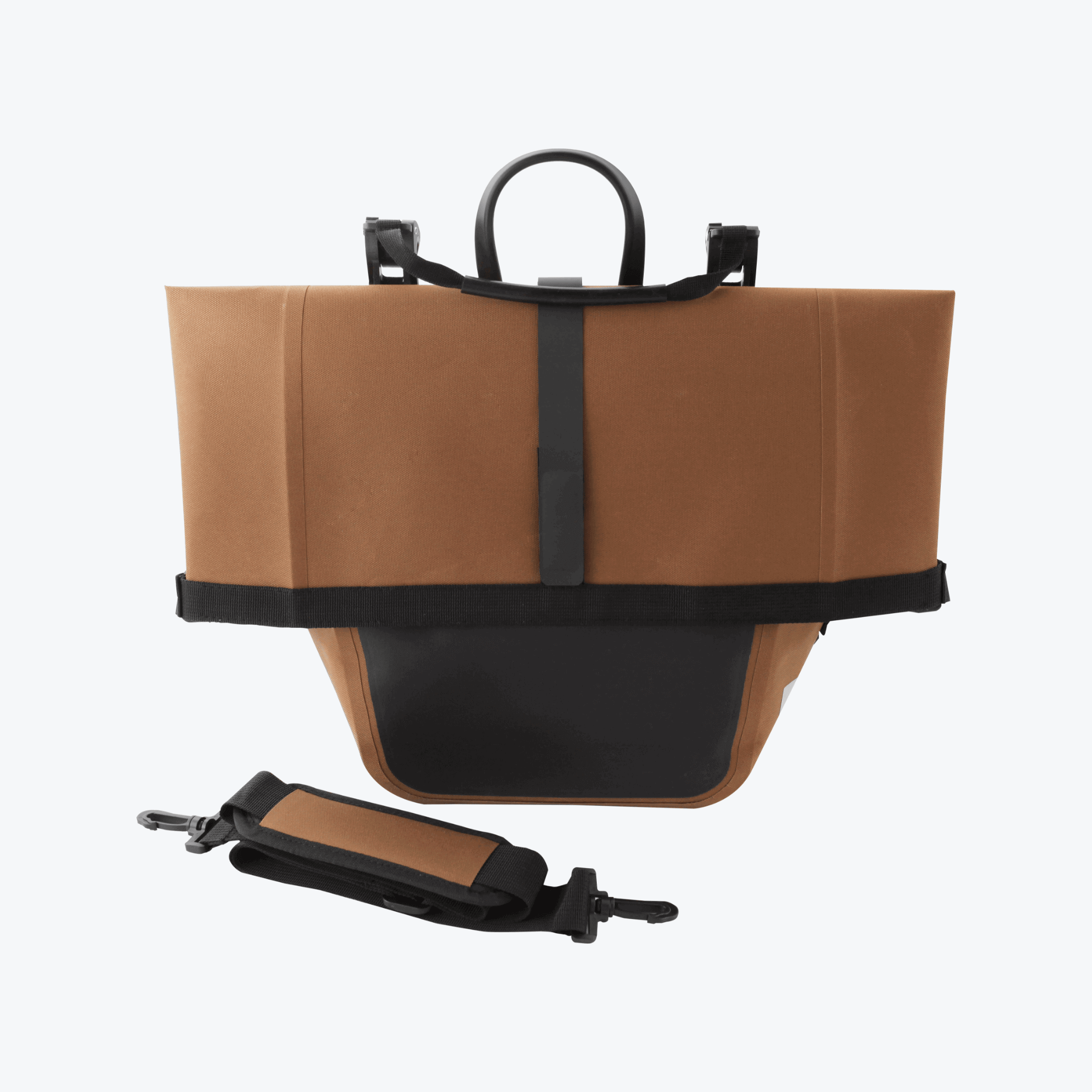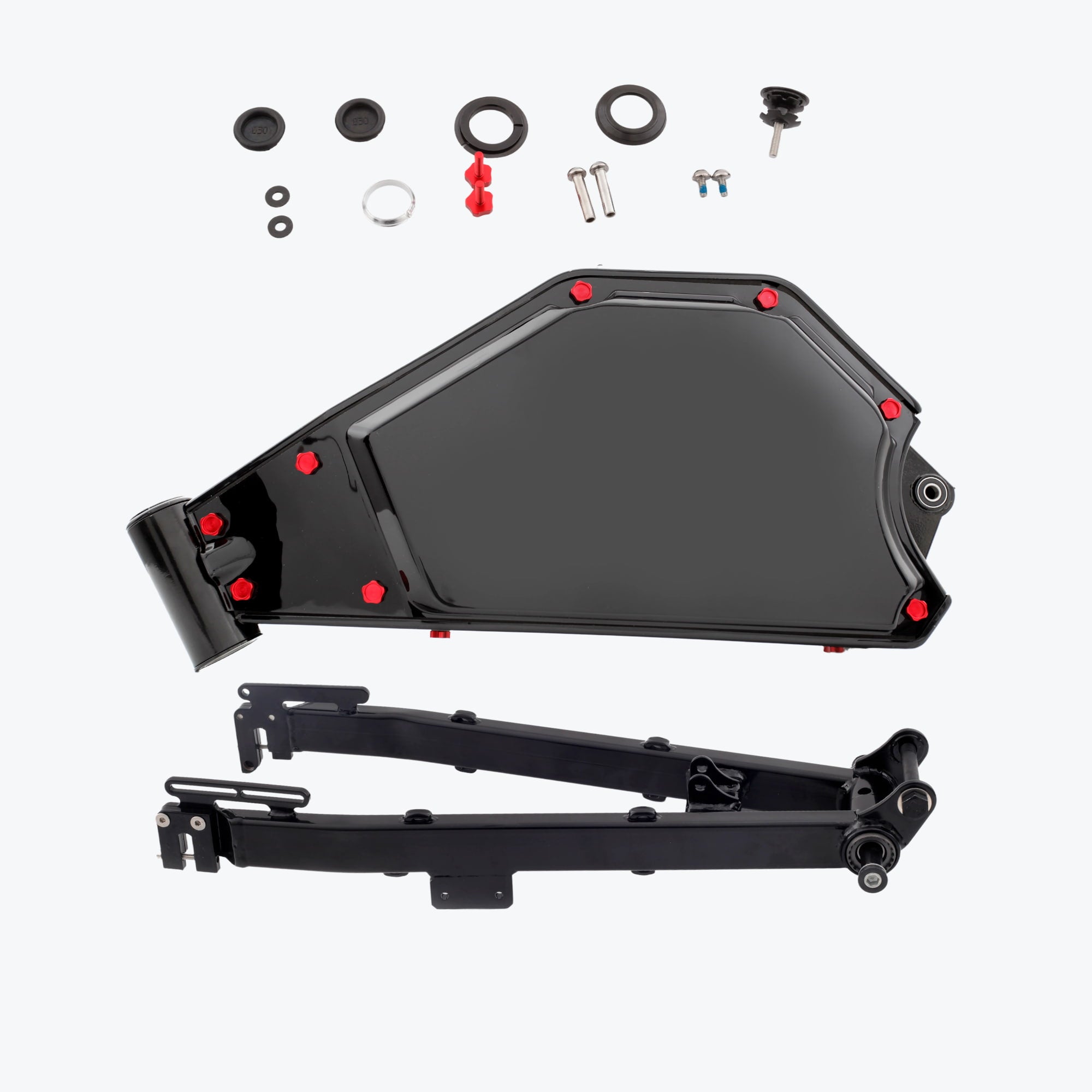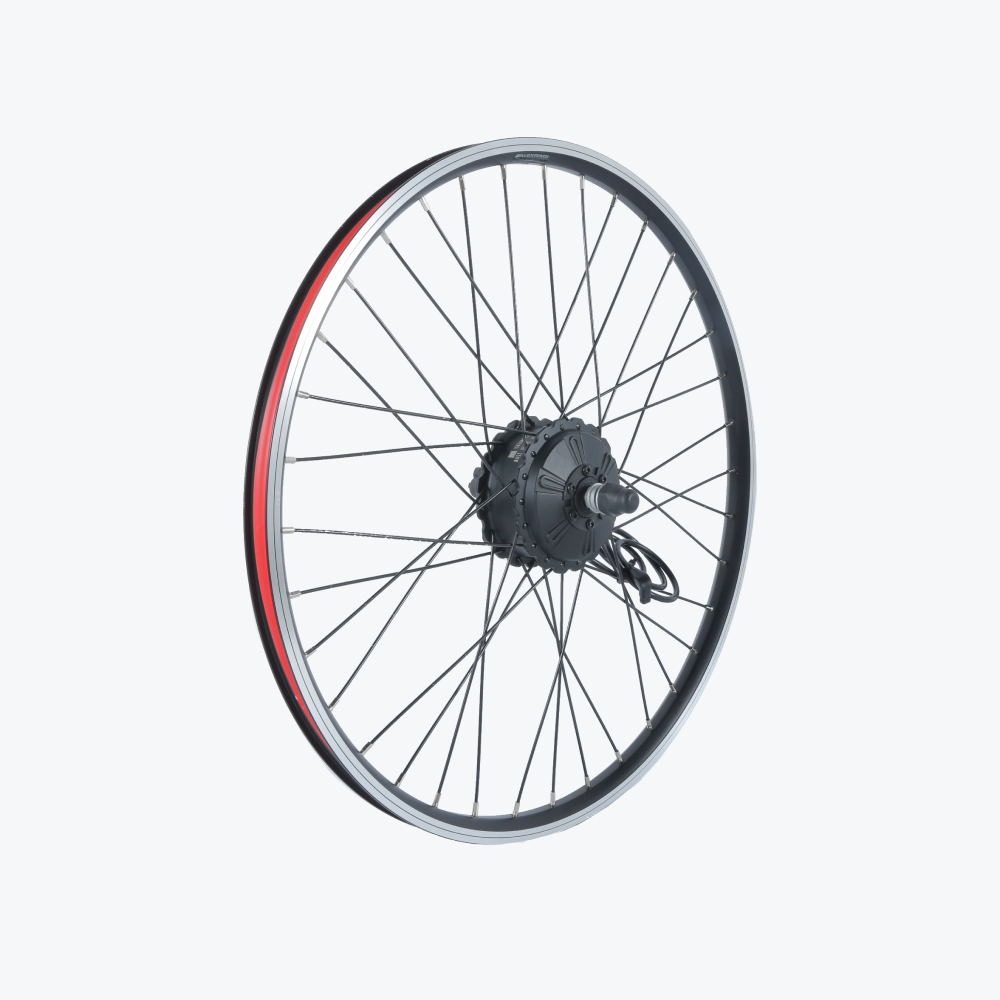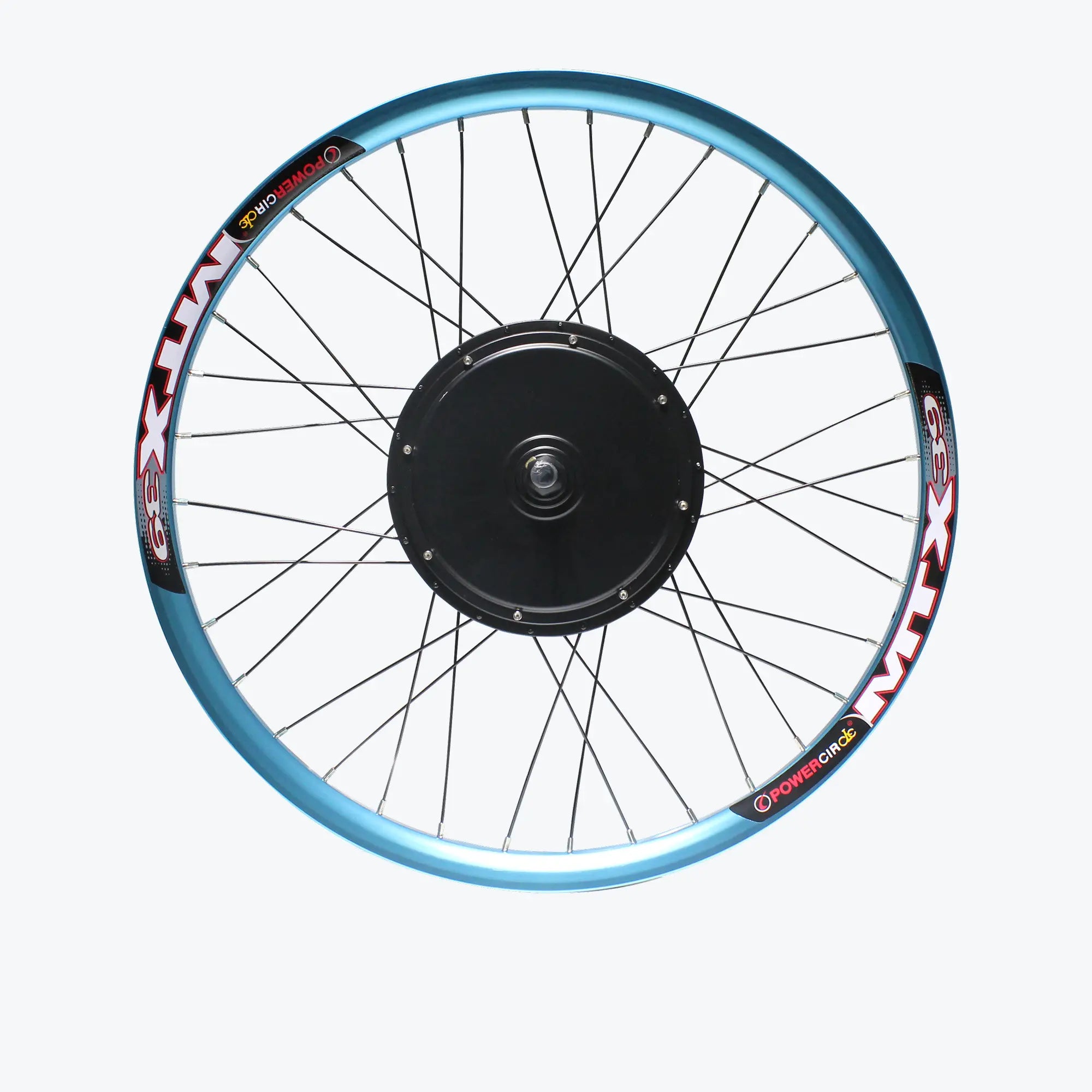Electric bikes have revolutionized cycling, offering an eco-friendly, cost-effective, and fun way to navigate urban streets, trails, and commuting routes. But if you already own a bike, you may face a critical decision: should you buy a brand-new electric bike or convert your existing bike with an electric bike conversion kit?
In this guide, we break down the differences, benefits, and drawbacks of both options, and explain why KirbEbike conversion kits might be the perfect choice for your riding needs.
Understanding Electric Bikes and Conversion Kits
Electric Bikes

A traditional electric bike, or e-bike, is a bicycle built with an integrated electric motor, battery, and control system. They often include a mid-drive or hub motor, a display, throttle, and pedal-assist system. E-bikes come in a wide range of styles — commuter, folding, mountain, cargo, and hybrid — and typically cost anywhere from $1,000 to $5,000 or more depending on features.
Electric Bike Conversion Kits

A conversion kit allows you to transform a conventional bicycle into an electric-powered bike. These kits include a motor (front or rear hub, or mid-drive), battery, controller, throttle or pedal-assist sensors, and mounting hardware. KirbEbike offers kits ranging from 250W to 4000W, compatible with most bike types, wheel sizes, and riding styles.
Key Advantage: Conversion kits let you retain your existing bike while gaining all the benefits of an e-bike — often at a fraction of the cost of buying new.
Electric Bike vs Conversion Kit: Cost Comparison
Upfront Costs
- Electric Bike: Higher initial investment. Premium e-bikes can cost $2,000–$5,000+.
- Conversion Kit: Lower upfront cost. KirbEbike kits start as low as £237.70 for a basic 250W kit and go up to £1,180 for a 52V 2600W high-performance rear hub kit.
Long-Term Value
- Conversion kits allow you to upgrade gradually. You can start with a basic motor and battery and later increase power or range.
- E-bikes may require full replacement if the battery or motor fails after several years, often costing significantly more than a replacement kit.
KirbEbike’s value proposition is simple: high-quality components, direct-to-consumer pricing, and flexible battery options.
Performance: Power, Speed, and Range
Performance varies widely depending on the motor type and battery capacity. Let’s break it down:
|
Feature |
Electric Bike |
Conversion Kit |
|
|
|
|
|
Motor Power |
Typically 250W–750W (road-legal) |
KirbEbike: 250W–4000W options |
|
Battery Capacity |
Fixed, often integrated |
Removable/upgradeable (KirbEbike 36V–72V, 7Ah–30Ah) |
|
Top Speed |
25–45 km/h (street-legal) |
25–85 km/h depending on kit & motor |
|
Range |
35–80 km |
40–100 km (depending on battery & motor choice) |
|
Maintenance |
Lower, built-in components |
Modular, easy to replace parts |
Example:
- KirbEbike’s 52V 2000W rear hub kit delivers speeds of 50–60 km/h and a range of 40–60 km with a 20–30Ah battery.
- For extreme off-road riders, the 72V 4000W kit reaches 75–85 km/h with a 40–80 km range.
The flexibility of conversion kits is unmatched — you can choose the power and battery combination that fits your riding style.
Front vs Rear Hub Motor in Conversion Kits

Many riders struggle with the choice between front and rear hub motors when converting their bikes. KirbEbike offers both, with mid-drive options as well.
Front Hub Motor
- Mounted in the front wheel
- Easier to install on most bikes
- Provides “pulling” sensation
- Good for flat terrain or light commuting
Rear Hub Motor
- Mounted in the rear wheel
- Offers better traction and stability
- Ideal for hills and heavier riders
- Feels like a natural “push” from the rear
Mid-Drive Kits (KirbEbike TSDZ8 series)
- Mounted at the bottom bracket
- Uses the bike’s gears for optimized torque
- Perfect for mountain biking or hilly commutes
- Torque-sensored for smooth pedal-assist
KirbEbike Conversion Kits clearly offer solutions for every riding style, making your decision simpler. If your concern is electric bike conversion kit front vs rear, think about your terrain and desired ride feel.
Installation and Maintenance
Electric Bikes
- Ready to ride out of the box
- Minimal assembly needed
- Maintenance is standard (tires, brakes, chain)
Conversion Kits
- DIY installation: KirbEbike kits typically take 20–30 minutes
- Tools included: Battery mounts, controllers, sensors, and wiring
- Modular components: Easy replacement of motor, controller, or battery
- Step-by-step video tutorials make assembly accessible for beginners
Pro Tip: Conversion kits like KirbEbike’s 36V 500W or 48V 750W mid-motor kits feature torque sensors and pre-wired connectors, reducing installation stress and maximizing reliability.
Battery Options and Range Flexibility

Battery is a critical factor in choosing between an e-bike or conversion kit. KirbEbike offers multiple high-quality battery options:
|
Kit Type |
Voltage |
Capacity |
Estimated Range |
Notes |
|
DP Battery |
36V–52V |
7Ah–30Ah |
40–70 km |
Mounts to existing frame holes |
|
JL Battery |
36V–48V |
11.6Ah–16Ah |
35–60 km |
Replaces downtube battery |
|
High-Capacity |
52V–72V |
20Ah–30Ah |
40–100 km |
Long rides, high-speed kits |
Batteries are removable, lockable, and compatible with KirbEbike’s full range of conversion kits, allowing upgrades without purchasing a new bike.
Pros and Cons: Electric Bike vs Conversion Kit
|
Aspect |
Electric Bike |
Conversion Kit |
|
Cost |
High upfront |
Low to medium |
|
Installation |
Ready to ride |
DIY, ~20–40 minutes |
|
Customization |
Limited |
Fully customizable motor, battery, and wheel size |
|
Maintenance |
Standard |
Modular and easy to replace |
|
Performance Options |
Moderate |
Wide range: 250W–4000W |
Bottom Line: Conversion kits give you control, flexibility, and affordability, especially with KirbEbike’s diverse options.
Electric Bike vs. Conversion Kit
Top 3 Electric Bikes
Urban Glide 500 Commuter E-Bike

Ideal for city riders, this commuter-style e-bike includes a 500W hub motor, built-in downtube battery, and comfortable geometry for daily use.
|
Advantages |
Disadvantages |
|
Ready to ride out of box |
High purchase price |
|
Integrated battery and wiring |
Limited upgrade options |
|
Good for flat terrain commuting |
Replacement parts expensive |
|
Sleek frame design |
Not suited for steep hills |
TrailMax 750 Mountain E-Bike

A hardtail mountain e-bike with a 750W rear hub motor, hydraulic brakes, and front suspension designed for trail performance.
|
Advantages |
Disadvantages |
|
Strong hill-climbing torque |
Heavy frame from built-in battery |
|
Off-road ready suspension |
Repairs require specialist service |
|
Good battery range for long rides |
Higher long-term maintenance cost |
|
Hydraulic brakes included |
Hard to modify/change components |
FoldGo Compact Urban E-Bike

Portable folding e-bike with 350W motor designed for commuters needing easy luggage storage and last-mile transportation.
|
Advantages |
Disadvantages |
|
Lightweight and foldable |
Lower power output |
|
Fits small storage spaces |
Shorter battery range |
|
Public-transport friendly |
Less comfortable on rough terrain |
|
Good for short urban trips |
Not ideal for larger riders |
Top 3 Conversion Kits (Upgrade Any Bike)
KirbEbike 48V 1000W Rear Hub Conversion Kit

A powerful and smooth-riding rear hub motor kit with LCD display, PAS sensor, and multiple 48V battery capacity options. Designed for daily commuting and fast urban riding.
|
Advantages |
Disadvantages |
|
High performance at affordable cost |
Slightly heavier hub motor |
|
Installation in 20–30 minutes |
Requires a strong rear wheel/frame |
|
Compatible with many bike styles |
Not torque-sensor based |
|
Upgradable batteries |
Must choose correct wheel size |
Best for: Riders upgrading an existing bike for commuting + speed
VoltRide 500 Front Hub Conversion Kit

Entry-level kit with a 500W front motor and basic battery options — friendly for beginners converting city bikes.
|
Advantages |
Disadvantages |
|
Very easy to install |
Less traction on front wheel |
|
Lightweight setup |
Not suitable for steep hills |
|
Budget friendly |
Lower power output |
|
Works with most forks |
Can feel unbalanced |
MountainBoost Mid-Drive 750 Conversion Kit

Mid-drive motor that uses bike gears to provide strong climbing performance — suitable for trail riders.
|
Advantages |
Disadvantages |
|
Excellent torque for hills |
Higher installation difficulty |
|
Balanced weight distribution |
More drivetrain wear |
|
Works with multiple wheel sizes |
Expensive compared to hubs |
|
Good for off-road riding |
May not fit all bike frames |
Choosing the Right Conversion Kit for Your Bike
Factors to consider:
- Bike Type: Road, mountain, folding, cargo, or hybrid
- Wheel Size: KirbEbike supports 20”, 26”, 27.5”, 28”, 29”, and 700C
- Desired Power: 250W for commuting, 1000W+ for speed or off-road
- Battery Range: 35–100 km depending on ride needs
- Motor Placement: Front hub, rear hub, or mid-drive
KirbEbike’s team can guide you through these options and ensure a perfect fit.
Eco-Friendly and Cost-Effective Choice
Conversion kits contribute to sustainability by allowing riders to upgrade existing bikes instead of discarding them. This reduces material waste, promotes recycling, and allows a more affordable e-bike experience.
KirbEbike’s commitment to quality, durability, and environmental impact ensures that every rider can experience high-performance electric mobility responsibly.
KirbEbike Customer Experience
KirbEbike is renowned for:
- Fast shipping: UK and US warehouses
- One-year warranty on all kits
- Free accessories and installation tools
- Responsive support: email and video guides for troubleshooting
Customers report thousands of miles of trouble-free rides, praising the quiet operation, smooth acceleration, and long-lasting batteries.
Frequently Asked Questions
Can I convert any bike into an electric bike?
Yes. KirbEbike kits support 13 standard wheel sizes, including 20”, 26”, 27.5”, 28”, 29”, and 700C. Most bicycles with a standard frame and brakes can be converted using a KirbEbike kit.
What is the difference between front and rear hub motor kits?
Front hub motors are easier to install and provide a pulling sensation, ideal for flat terrain. Rear hub motors provide better traction, stability, and a natural pushing feel, ideal for hilly or heavy-load rides. KirbEbike also offers mid-drive kits for optimal torque and performance.
How long does it take to install a KirbEbike conversion kit?
Most kits take 20 minutes, with special models taking up to 40 minutes. Kits include all required hardware, tools, and step-by-step guides to simplify installation.
How far can I ride on a single battery charge?
Range depends on the battery type, motor power, terrain, and riding style. KirbEbike batteries range from 35 km to 100 km, with 36V–72V batteries providing multiple options for commuting or long rides.
Can I upgrade my battery later?
Absolutely. KirbEbike allows riders to add or replace batteries for longer ranges. Extra batteries are sold separately and are compatible with all existing kits.
Conclusion: Electric Bike vs Conversion Kit
The decision comes down to budget, customization, and existing bike ownership:
- If you want a fully integrated system, ready to ride, and don’t mind spending more, a prebuilt e-bike is convenient.
- If you already own a bike or want flexibility, performance upgrades, and cost-effectiveness, a KirbEbike conversion kit is the smarter choice.
With high-performance motors, modular batteries, and easy installation, KirbEbike kits offer a complete solution for riders seeking speed, range, and versatility without breaking the bank.
Upgrade your bike today and join thousands of happy riders enjoying the freedom, efficiency, and fun of an e-bike — the KirbEbike way.

